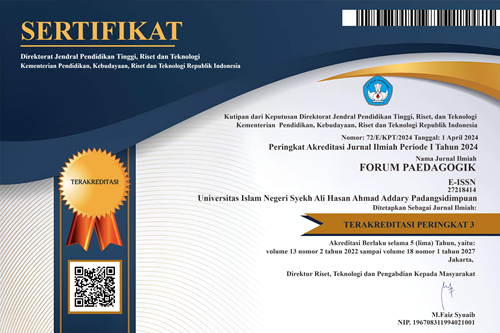THE ABILITY OF ISLAMIC RELIGIOUS EDUCATION TEACHERS IN IMPLEMENTING THE CURRICULUM AT `AISYIYAH TSANAWIYAH MADRASAH PASAR MERAH MEDAN
Education is the most important part of the process of transforming knowledge from educators to students. Teachers act as the frontline in the scope of the world of education which is very important in determining the quality of generations. In the world of education, the curriculum is the spirit that must be evaluated innovatively, dynamically and periodically according to the development of the times and science and technology which is equivalent to the competency demands needed by society and the world of education. In Indonesia, the curriculum has undergone several changes and one of them is the curriculum. The main purpose of this change is for the improvement of a good and quality educational institution with the aim of the progress of a nation and state. This research uses qualitative descriptive analysis methods and data techniques which include data condensation, data presentation and conclusion making. This study aims to explain the analysis of the concept and implementation of the Curriculum. This curriculum is implemented by several schools that have been appointed by the government called piloting schools in Indonesia in accordance with Decree Number: 3374/KEP/D/KR/2016 dated July 11, 2016.
Keywords : Implementation; Teacher Ability; Curriculum.
Agama, J., Pendidikan, D. A. N., Studies, I., Sumatera, M., Jalan, U., Mukhtar, K., & No, B. (2020). The Factors That Affecting Students ’ Learning Difficulties In The Islamic Eduction Subject. 12(2). https://doi.org/10.30596/intiqad.v12i2.5194
Aini, J. (2022). Kemampuan Guru Pendidikan Agama Islam Melaksanakan Penilaian Hasil Belajar Siswa. GUAU: Jurnal Pendidikan Profesi Guru Agama Islam, 2, 17–24.
Aisyah, S., & Astuti, R. (2021). Analisis Mengenai Telaah Kurikulum K-13 pada Jenjang Sekolah Dasar. Jurnal Basicedu, 5(6), 6120–6125. https://doi.org/10.31004/basicedu.v5i6.1770
Ariandy, M. (2019). Kebijakan Kurikulum dan Dinamika Penguatan Pendidikan Karakter di Indonesia. Sukma: Jurnal Pendidikan, 3(2), 137–168. https://doi.org/10.32533/03201.2019
Arnadi, A. (2022). Upaya Guru Pendidikan Agama Islam Dalam Mengimplementasikan Kurikulum 2013 Madrasah Ibtidaiyah Se-Kkm 2 Sambas. Inspiratif Pendidikan, 10(2), 247. https://doi.org/10.24252/ip.v10i2.18571
Basrowi & Suwandi. (2014). dalam Penelitian Pendidikan Bahasa. 信阳师范学院, 1(1), 32.
Enrekang, S. M., & Parepare, U. M. (2018). PENERAPAN PEMBELAJARAN PENDIDIKAN AGAMA ISLAM DALAM MEMBENTUK KARAKTER PRIBADI YANG ISLAMI Elihami Elihami Abdullah Syahid A . Pendahuluan Pendidikan Agama Islam sebagai suatu proses ikhtiyariyah mengandung ciri dan watak khusus , yaitu proses penanaman ,. 2, 79–96.
Genjik, B., Studi, P., Sosiologi, P., Untan, F., & Email, P. (n.d.). ANALISIS PEMANFAATAN MEDIA PEMBELAJARAAN SOSIOLOGI BERBANTUAN INTERNET OLEH GURU PADA. 1–8.
Jihan, I., Asbari, M., & Nurhafifah, S. (2023). Quo Vadis Pendidikan Indonesia : Kurikulum Berubah , Pendidikan Membaik ? 02(05), 17–23.
Kosassy, S. O. (2017). Analisis Konsep Dan Implementasi Kurikulum 2013. PPKn & Hukum, 12(1), 78–89.
Muhammad Muttaqin. (2021). Konsep Kurikulum Pendidikan Islam. TAUJIH: Jurnal Pendidikan Islam, 3(1), 1–16. https://doi.org/10.53649/taujih.v3i1.88
Nurmadiah, N. (2016). Kurikulum Pendidikan Agama Islam. Al-Afkar : Jurnal Keislaman & Peradaban, 2(2). https://doi.org/10.28944/afkar.v2i2.93
Pillawaty, S. S., Firdaus, N., Ruswandi, U., & Syakuro, S. A. (2023). Problematika Guru Pendidikan Agama Islam Dalam Mengimplementasikan Kurikulum Merdeka. Shibghoh: Prosiding Ilmu Kependidikan UNINDA Gontor, 1, 602–611. https://ejournal.unida.gontor.ac.id/index.php/shibghoh/article/view/9504
Pokhrel, S. (2024). No TitleΕΛΕΝΗ. Αγαη, 15(1), 37–48.
Rahayu, R., Rosita, R., Rahayuningsih, Y. S., & Hernawan, A. H. (2022). Jurnal basicedu. 6(4), 6313–6319.
Rahmadhani, R. N., & Istikomah, I. (2023). Kompetensi Guru PAI dalam Mengimplementasikan Kurikulum Merdeka Belajar di Sekolah Muhammadiyah. Al-Liqo: Jurnal Pendidikan Islam, 8(1), 20–36. https://doi.org/10.46963/alliqo.v8i1.793
Sidik, Z., & Sobandi, A. (2018). Upaya meningkatkan motivasi belajar siswa melalui kemampuan komunikasi interpersonal guru ( T he effort of improving students ’ learning motivation through teachers ’ interpersonal communication skill ). 3(2), 190–198. https://doi.org/10.17509/jpm.v3i2.11764
Tanjung, E. F. (n.d.). PEMBELAJARAN ACTIVE LEARNING PADA PENDIDIKAN AGAMA ISLAM
Tanjung, E. F., Zahra, H., & Manalu, B. B. (2023). Model Pembelajaran Pendidikan Agama Islam Berbasis Multimedia Dalam Memotivasi Belajar Siswa Kelas VIIA Di SMP Negeri 1 Sawit Seberang. Educate: Jurnal Ilmu Pendidikan Dan Pengajaran, 2(3), 246–257. https://doi.org/10.56114/edu.v2i3.11174
ujang cepi barlian, siti solekah, puji rahayu. (2022). implementasi kurikulum merdeka dalam meningkatkan mutu pendidikan. Implementasi Kurikulum Merdeka Dalam Meningkatkan Mutu Pendidikan, 10(1), 1–52. https://doi.org/10.21608/pshj.2022.250026
Widiyaningsih, P., & Narimo, S. (2023). Peran Guru dalam Memaksimalkan Semangat Belajar Peserta Didik pada Implementasi Program Kurikulum Merdeka di SMK Negeri 1 Boyolali. JIIP - Jurnal Ilmiah Ilmu Pendidikan, 6(8), 6325–6332. https://doi.org/10.54371/jiip.v6i8.2753
 Copyright (c) 2025 Sri Wahyuni
Copyright (c) 2025 Sri Wahyuni

This work is licensed under a Creative Commons Attribution-ShareAlike 4.0 International License.











